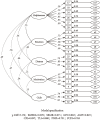Psychometric properties of the post-stroke depression scale in the sequelae stage
- PMID: 37063589
- PMCID: PMC10102496
- DOI: 10.3389/fpsyg.2023.1130497
Psychometric properties of the post-stroke depression scale in the sequelae stage
Abstract
Aim: To evaluate the psychometric properties of the Post-Stroke Depression Scale in the Sequelae Stage (PSDS-SS).
Background: The incidence of the sequelae stage Post-Stroke Depression (PSD) is high, and the best screening tools are still lacking. Under this circumstances, our research team developed the PSDS-SS by Delphi method, but its psychometric properties need to be further verified.
Method: This was a cross-sectional study. Seven hundred and sixteen stroke patients in the sequelae stage were enrolled by purpose sampling from May 2022 to September 2022. The exploratory factor analysis (EFA) and confirmatory factor analysis (CFA) were used to verify the factor structure of the scale. The reliability of the scale was tested by Cronbach's α coefficient, test-retest reliability and composite reliability. The validity of the scale was tested by criterion-related validity, convergent and discriminant validity.
Result: Eight items were deleted through item analysis. The EFA ended up with a 5-factor scale including 24 items after removing one item with low factor loading. Finally, a 21-item model was established by confirmatory factor analysis, and all the fit indexes were acceptable. The reliability and validity of the total scale and each factor are acceptable.
Conclusion: The PSDS-SS has a stable factor structure, and demonstrated good reliability and validity. And it would be an effective tool to assess PSD in the sequelae stage.
Keywords: confirmatory factor analysis; exploratory factor analysis; measurement development; post-stroke depression; sequelae stage.
Copyright © 2023 Zeng, Li, Ning, Fu, Ge, Gan, Lin, Lin and Li.
Conflict of interest statement
The authors declare that the research was conducted in the absence of any commercial or financial relationships that could be construed as a potential conflict of interest.
Figures
Similar articles
-
Early symptom measurement of Post-Stroke Depression (PSD).J Affect Disord. 2016 Jun;197:215-22. doi: 10.1016/j.jad.2016.03.038. Epub 2016 Mar 10. J Affect Disord. 2016. PMID: 26995465
-
Factor structure and reliability of the symptom measurement of post-stroke depression in the rehabilitation stage.BMC Psychiatry. 2024 Jun 14;24(1):448. doi: 10.1186/s12888-024-05906-w. BMC Psychiatry. 2024. PMID: 38877421 Free PMC article.
-
The Chinese version of the Perceived Stress Questionnaire: development and validation amongst medical students and workers.Health Qual Life Outcomes. 2020 Mar 13;18(1):70. doi: 10.1186/s12955-020-01307-1. Health Qual Life Outcomes. 2020. PMID: 32169070 Free PMC article.
-
[Development and Psychometric Evaluation of the Ischemic Stroke Distress Scale (ISDS)].J Korean Acad Nurs. 2023 Feb;53(1):12-27. doi: 10.4040/jkan.22090. J Korean Acad Nurs. 2023. PMID: 36898682 Review. Korean.
-
Development and psychometric appraisal of Head Nurse Research Leadership Scale.Nurs Open. 2023 May;10(5):3378-3387. doi: 10.1002/nop2.1592. Epub 2023 Jan 9. Nurs Open. 2023. PMID: 36622948 Free PMC article. Review.
References
-
- Bian C., He X., Qian J., Wu W., Li C. (2009). The reliability and validity of a modified patient health questionnaire for screening depressive syndrome in general hospital outpatients. J. Tongji Univ. (Med. Sci.) 30, 136–140.
-
- Brust M., Gebhardt W. A., van der Voorde N. A. E., Numans M. E., Kiefte-de Jong J. C. (2022). The development and validation of scales to measure the presence of a teachable moment following a cardiovascular disease event. Prev. Med. Rep. 28:101876. doi: 10.1016/j.pmedr.2022.101876, PMID: - DOI - PMC - PubMed
LinkOut - more resources
Full Text Sources




